What is role play for young children?
Children play role-playing games starting at about 2 years old. The child's partner in such a game may first be a parent or an older child. And from the age of 3 they play on their own or with other children. In the process, you can notice how much more the child opens up more and more, liberates himself, speaks more, shows more ingenuity and imagination. Of course, provided that he, in principle, plays such games, and this depends on the parents’ input.
At the beginning there will be a parent-child role play. For example, “mothers and daughters”. Well, who among us didn’t play this as a child? Or a game of buyer and seller. In such games, the child imagines himself in the place of a mother, a salesperson or a doctor, for example. In this way he tries to reproduce their actions and emotions. In such a game, a child not only puts a doll to sleep, but also learns to experience such feelings as care, tenderness, severity, and affection.
The feelings that a child acts out in such stories will manifest themselves in real life. That is, by losing care, it will be easier for such a baby to take care of someone in life.
Role-playing teaches real-life feelings and emotions.
And what is not unimportant, in such a role-playing game, we parents can see or hear things that can give us a lot to understand. For example, if in the game “kindergarten teacher”, your child in the role of teacher screams and hits children, this is a reason to think and worry. Where could he see such a pattern of behavior?
Role-playing games on the topic children come a little later, already in kindergarten. This is an important stage that helps the child to contact other children.
How are role-playing games beneficial for a child’s development?
The benefits of such activities are varied. They are as follows:
- creating communicative and speech experience;
- enable the child to act in conditions reminiscent of real situations;
- opening up the chance for exploration and experimentation;
- help to gain social skills from communicating with children and adults;
- by trying on an unusual role, the baby will better understand those around him;
- promote knowledge of different cultures, expression of thoughts and feelings in the most friendly atmosphere;
- provide an opportunity to learn better through entertainment;
- stimulate imagination and creative skills.
Role-playing games are one of the effective language learning techniques. During the course, the baby copies the phrases he hears and can also form his own sentences. This technique promotes the development of vocabulary and experience of communicating with other people.
What role-playing games provide for preschool children
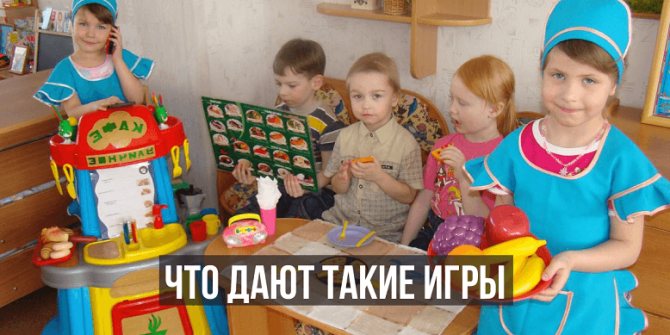
- The child will not be bored alone. He will always be able to entertain himself with such a game, come up with and simulate a plot.
- It is easier for a child to adapt to school dramatizations. Since he already has the skills to play such role-playing games, it will not be difficult for him to take part in various events at school.
- The child will not have problems communicating or finding friends. Such active and sociable children become teachers' favorites.
- If a child is accustomed to communication, to adapting to any situation, then there should be no protests against school and studies. Children are more inclined to study.
- With the help of role-playing games, the child will more easily decide on his favorite school subjects, understand what he can do best and what he strives for. Children make their choice of future profession more confidently.
- Role-playing games help children develop the ability to think creatively and fantasize.
- He sets the goal of the game, goes to some pre-planned result. It's hard to argue with the value of this skill.
- During the game, the child learns to understand his feelings and emotions and cope with them.
- The vocabulary is continuously updated and enriched depending on the variety of scenarios.
- Role-playing games in a child's life develop his intellect.
Types and examples of children's entertainment
Role-playing games are one of the important components of children's development. Activities like these help stimulate better imagination. Pretense or artistic play becomes a significant component of children's development.
“Mothers and daughters” and other emotionally charged activities
With the help of such entertainment, a child can form a clear social model of behavior in a team. For example, instill in girls the maternal instinct and mechanisms for handling the future newborn. In addition, the event helps to develop communication experience to the fullest.
In the same category are emotional games that evoke experiences that are not yet available: raising children, adult family relationships. It is worth showing the kids your own example: pick up a doll, kiss it, then lull it to sleep. My daughter will quickly learn to repeat such actions. It is useful for the smallest babies to demonstrate body parts on the baby doll.
“School”, “hospital”, “shop”, other situational actions
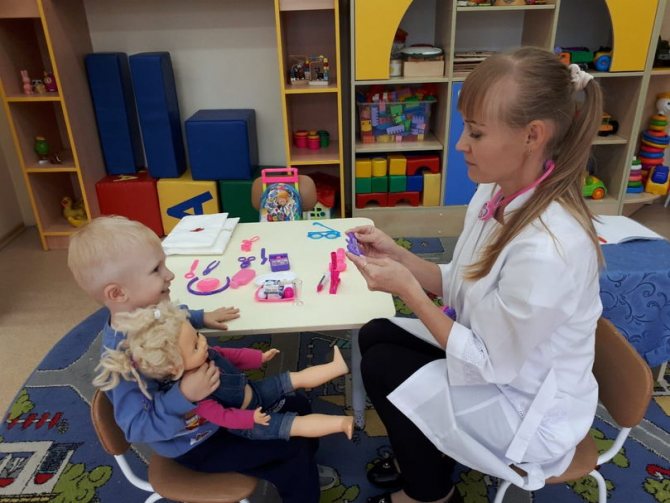
These activities are often accompanied by the use of special props: toy cash registers, money, doctor’s kits. In addition to modeling behavior and forming reactions to different formats of situations, an understanding of the functionality of additional props is developing. While playing with your baby, adults need to be shown how to count money correctly. For example, teach how much is fifty and ten, what “money” the buyer needs to return as change.
"Behavior Rehearsal"
This event is a simulation of an incident or an imaginary situation, the repeated experience of which will help to gain some experience in the game. “Rehearse” your child’s upcoming birthday, remembering the mistakes of the past holiday. You can imagine a “mock zoo” after returning from a real event. Such pastime allows you to get rid of psychological stress, it is often used to cause “re-experiencing” both positive and negative emotions. After this, it is easier to analyze the events and help the baby overcome stress (during the course of this game, it is advisable to ask the baby leading questions).
When a child is scared by an animal at the zoo, then re-experiencing a similar situation with a rubber animal will help get rid of the fear. For small children, repeating certain activities is suitable: rocking the child, turning the steering wheel. Help your baby and set an example by doing it several times to reinforce it.
Theater and masquerade
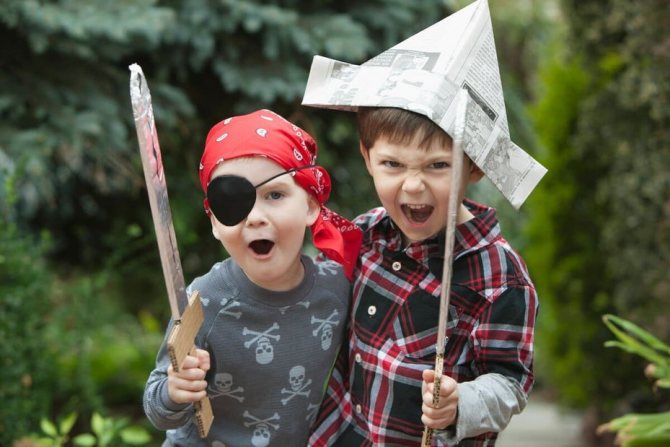
One of the most favorite games for children is stage dressing. This is explained not only by the inclusion of adults in the entertainment, but also by the approach of a favorite holiday (birthday, New Year, May Day). A costume performance will help you fully “fit into” the role, as well as gain admiration from your surroundings, as well as a feeling of “anonymity.” This will rid the baby of phobias and complexes, he will be more relaxed, since he is wearing a mask and no one will be able to recognize him.
Role-playing games are important in the development of children - they form a significant part of training and upbringing. Such events help to better strengthen the imagination and practice various skills. Children enjoy learning about the world through fun because communication allows them to exchange ideas. Through such games, the baby imagines himself in the future.
Guiding role-playing games for children: where to start, how to organize the game
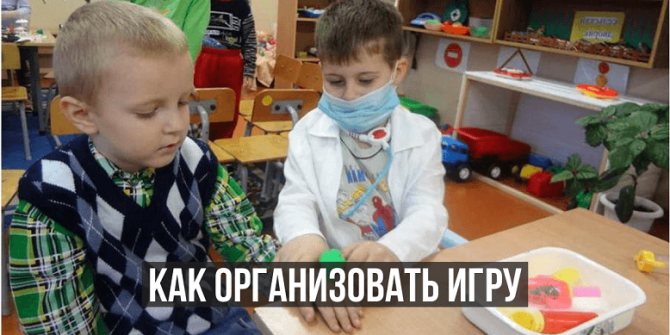
If your baby is now going to kindergarten or sitting with a nanny, then you can exhale, professionals will do all the work for you, or almost all of it. Role-playing games in kindergarten are organized by teachers; they know very well how to do it, what is needed for it, and most importantly, how to interest children in the game.
If everything is on your shoulders, then here are a few rules.
How to organize role-playing games for preschool children
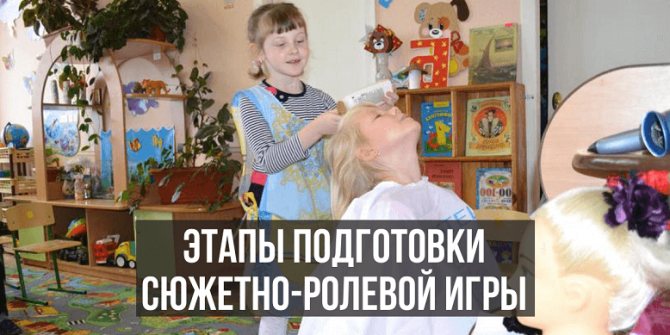
- When is it time to start playing these story games? If your child has reached about three years of age and already has a good vocabulary.
- Selection of the plot. It's very simple. What is your child interested in? What toys does he like to play with the most? Ask your child what he wants to become in the future. Most often, children know the answer to this question. If not, read books on the topic “Choosing a profession.” This will guide you when choosing a topic.
- Having trouble deciding on a topic? No problem. The buyer-seller game always works. Children often watch your trips to the store, they know the procedure.
- Props. To fully immerse yourself in the situation, you need to select the necessary props. Well, for example, for the game “Seller-Buyer” you will need: a calculator as a cash register, money - it can just be pieces of paper or cut out numbers from the calendar. Envelope as a buyer's wallet. A set of “goods” for sale, it is advisable to select toys or items of a certain theme (stuffed toys, plastic fruits and vegetables, books).
- Preparing the props can be done together with the child. Involve him in the preparation, trust him to collect items for sale, or let him cut up pieces of paper for money.
- Before starting the game, make sure that your child really understands the plot, he is familiar with this situation, he understands the actions and words in this plot.
- You can play. But the game will be productive and rich only if not only the child, but you yourself want to play. If you are irritated by the long preparation and generally have your own things to do, the baby will feel it and the game will not work out.
- How often to play? Every day! This will only bring positive results. I repeat that the role of role-playing games in a child’s life is difficult to overestimate.
The more often a child plays such games, the more he develops business communication skills. That is, he is able to negotiate and convince, to win over to his side.
The second side of the coin: during the game, the child can get used to obeying. And this is precisely why parental participation is important at the initial stage. Parents should help a shy and timid child overcome his fear and take on the role of a leader. Here the child’s role in the role-playing game should be the main one, the leading one, but not all the time.
Role playing games
This section is devoted to the so-called MIGs or office role-playing games. On the page you can find materials on creating and running games of this kind, as well as some interesting games.
Small role-playing game (SRP)
Features and rules of role-playing games. The game gives the child the opportunity to try himself in adult roles, to show creativity in non-standard life situations. A game is a competition in solving problems of human interaction.
- Role-playing game (any game) features:
- sociocultural function (during the games, the cultural traditions and values of the people are recreated, and the game itself acts as a standard of cultural values, because it contains the rules of behavior and interaction of people, public universal values);
- communicative function (while playing, children learn to establish new connections and relationships with people, organize interaction to achieve goals);
- activity function (a game is an action, a real activity, in addition, the game makes it possible to use various types of activities);
- function of realizing the child’s ability, self-realization (any game has a goal, to achieve which the participant must use all his knowledge, skills and abilities in order to evaluate himself at the end of the game);
- protective or corrective function (game is a model of society, its life and relationships, therefore, during the game, a child can be taught to see and solve his problems).
- Role-playing game features:
- fictitious situation
- extremeness;
- clearly defined rules.
- Role-playing game rules. The master is always right (he decides all controversial issues and situations in the game).
- Mandatory knowledge and compliance with the rules of the game.
- Here and now (the game has a clearly limited time frame, all relationships developed in the game do not transfer to real life).
- Information about the game role (it is a secret for other participants in the game, it is a “trump card”, an advantage of any player).
- Possibility of in-game death (“the deceased” cannot communicate with current players or transmit any information to them; all information known to him “dies” with him).
- A friendly attitude towards fellow players (the main task of the game is to establish interaction, cooperation in the process of achieving game goals).
- The law of the game territory (the game territory is always limited and it is prohibited to perform game actions outside of it; anyone who leaves the game territory leaves the game).
- Unity of the playing role (image - who are you? Where are you from? what are you like? goal - what should you do? instructions - how can you complete your tasks, achieve the best result?).
- building your gaming legend;
- analysis of conditions and opportunities for conducting role-playing games;
- general rules;
- The master organizes a spectacular beginning and end of the game.
Technology of organizing and conducting the game
The person who organizes and conducts the game is traditionally called a master. He himself does not participate in the game; his goal is to create conditions for children to play successfully. In order for the game to be successful, you need to perform the following sequence of actions:
- analysis of conditions and opportunities for conducting role-playing games;
- setting a goal for this game;
- choosing a game that realizes these goals;
- familiarization with the text of the game;
- informing and preparing game participants;
- study of game participants and assignment to roles;
- gathering of participants: getting ready for the game, getting acquainted with the general introductory game and its rules, issuing individual roles (1-2 days before the game);
- preparation of instruments and playing area;
- immediately before the game, individual consultations, individual distribution of tools;
- gathering of players, announcement of the start of the game.
During the game, the master gives advice on the content of the role and methods of play, controls the rules of the game, maintains a high emotional mood of the players, supports the development of the plot of the game using the means inherent in the game, helps players who cannot cope with the game situation, and organizes a spectacular end to the game.
After the game, it is necessary to conduct a talk, where each participant tells what role he played, what means he used, with whom he interacted, and whether he was able to achieve his goals. The conversation of the game takes place in a general circle, in an atmosphere of goodwill and voluntariness of statements. The greatest pedagogical effect will come from conducting group and individual analysis, the subject of which can be relationships in the group, individual characteristics and methods of activity in a conflict situation, personal difficulties that arose during the game, problems of values and morality.
Rules of the game
- the master is always right, i.e. in all controversial situations, the final word remains with him.
- mandatory knowledge and compliance with the rules of the game.
- “here and now.” Do not transfer the relationships of life to the game and vice versa.
- role information is secret and cannot be disclosed, this will make the game uninteresting to you and your comrades.
- In-game death is possible in the game when exposed to any weapon; in this case, the player leaves the game and has no right to disclose information.
- a friendly attitude towards fellow players.
- careful handling of gaming instruments.
- law of the playing area.
In addition to these general rules, each game may have its own technical rules, which stipulate the possibility of using gaming tools.
List
- English killer
- Desert Island
- Night of the Triffids
- Mafia
- Royal Ball
- turnip
- Yacht
- Dresser
- Planet
- 3 boats
- Chronicle of a Sinking Submarine
- Sirius
- Desert Island
- Trouble in the Deep
- Detective story
- Role play set
- Role Play Set 2
- Lords of the Seas
- President elections
- Litigation “Planet and Man – Friends or Enemies”
- The jungle book
- Citadel
- Fairy Chess
- Role-playing games for kids
- Stay alive
- Rainbow of the planet Gnaremub
- Galactic Commonwealth
- Voice of an Alien Planet
- Situational role-playing game “Crystal of Power”
- Detective in Slavic style
- Role-playing game "King Arthur"
- Game "New Civilization"
- Game "Teleportation"
- Game "Book Depository"
- Game "Arzaks and Menvits"
- Role-playing game "Balls"
- Role-playing game "Virus"
- Team game "Vampires"
- The Last Curse of the Magicians
- The Last Curse of the Magicians
- Role-playing game "Sinegoria"
- Role-playing game "Toontown"
Role-playing games (RG) are of two types: scripted and non-scripted.
Scenario RI
They belong to the category of great creative works. A group of organizers takes as a basis a real-life situation (revolution, Miklouha Maclay’s meeting with the aborigines, etc.), or a situation from a book, and adapts it to the real location of the game and the participants. After that, tasks are formulated for the participants, which talk about the situation and their role in it. (Of course, the task must be prepared in advance so that the children have time to familiarize themselves with materials about the situation: read books, ask adults, prepare costumes.)
Scenario games, as a rule, have the following pedagogical goals: introducing children to historical material in an interesting way and developing acting abilities. Such games are easier to carry out than non-scripted games and, as a rule, give fewer failures during execution.
Non-scripted RI
They belong to the category of small creative affairs.
Non-scripted RI can end unplanned for two reasons: loss of interest in the game, fulfillment of the game goal by the game participants. Accordingly, special attention should be paid to avoiding these reasons when preparing RI.
The organizers formulate for themselves the goals of the game participants (for example: to earn as much money as possible, to establish a parliamentary government, etc.). The following describes the possible roles of RI participants. Whether or not to tell children about their game goals and their roles depends on the specific game. Sometimes the role goal of the participants is set through the situation, and not directly. After developing the roles, methods of influencing the course of the game are considered, roles are selected for game masters, and when and how game masters begin to influence the game are described. Options for setting additional game goals for the children in a playful way are outlined, in case they complete their goal ahead of schedule.
Non-script games, as a rule, have the following pedagogical goals: development of independence, the ability to navigate in a new situation, development of intellectual potential, formation of the concept of goals and means of achieving them.
Stages of creating a role-playing game
- Problem formulation. The problem must excite the author (or must be savored, which requires some skill). Break it down into tasks.
- A fan of bright, emotional scenes, pictures that will touch the players. This is necessary because what is remembered is mainly those things that took place against the backdrop of strong emotions. The scenes should roughly correspond to the tasks at hand.
- Thinking through the “geography of the game”, that is, what is where, what characters play what. The development of scenes, that is, the plot. What groups of players are there? Modeling and isolation of constants and variables. + rules and standards. (+ sinusoidal activity).
- Scheduling by people or teams, classification by individuals
- Thinking through background activities (creating special activities for younger psychological age).
- Prescribing game algorithms (to increase the tension in the game).
- Beautiful and clear design of the game.
- Connecting the game with the group leaders.
Please note:
- Atmosphere is very important for role-playing games. Because if you want people to feel like pirates, be kind enough to put them on a “ship”. Music, costumes, vocabulary are used to create an atmosphere...
- A role setting is a way of creating a role, an opportunity to distinguish a person from the mass.
- You can introduce a role-playing moment into almost any game. And it's often worth doing.
What types of games are there?
- Epic games (an activity for the entire shift)
A game that becomes the leading activity, the core of the shift, subjugating all teams and groups, camp-wide mass holidays. The epic game is based on an invented legend. It becomes overgrown with rituals, secrets, a mandatory division of labor and responsibilities, and certainly has a printed set of laws - taboos, regulations, code of honor, etc. The secret of the game is in a well-thought-out program down to the smallest detail and an unusual plot that easily solves many children's problems in the squad. - Field games
Such games are most often played “in the field,” that is, in a more or less uninhabited area, which is why they are called that. For example, players decide to play Ancient Rome. They distribute among themselves the roles of patricians and plebeians, warriors and slaves, residents of neighboring countries. The scale can be different: somewhere they are trying to depict the entire city, or even several cities or even the whole Mediterranean, somewhere, say, guests at a patrician’s feast. Throughout the game, players will attempt to live as they believe the characters lived, speak as they would speak, and make decisions based on their characters' goals. - No less common are “ board-word” games
, they are also modules, “dangers”, and so on. In such games, no one runs anywhere or waves anything, and the actions of the heroes are simply described. For example, a player says: “I’m climbing a rope onto a wall.” What and how he succeeds is determined using the rules of the game. They give the player truly limitless possibilities, but require a developed imagination.
Beware, game!!!
Paradoxical as it may seem, the most serious obstacle to using the game in a camp is the professional training of the counselor and his teaching experience.
- Firstly, alas... but many counselors use dominant methods of communicating and raising children: discipline, rules, distribution of roles, routine. Inspector functions are prohibited in the game: they destroy the game itself. The task of a competent game organizer is to ensure that the players are “ordered, punished and explained” by the game itself.
- Secondly, the organizer can only influence the course of the game, but cannot determine it. A personal attitude cannot be divided into right or wrong; it either arises or it does not. And the attitude of the players to the last game may not be at all what the counselors expected. Role-playing is an unpredictable, spontaneous method! The use of stereotypes here leads to participation “for show.”
- Thirdly, it is imperative to avoid the symptoms of “gambling”, when a child begins to use the game as compensation for his own lack of success in life. Most often this is due to the construction of games according to a template. After a series of similar games, the players develop the illusion of their own “coolness” - “we know everything, we can do everything.” As a consequence, there is a desire to act only in the mastered area, and then the child opens up only in play.
- But the most dangerous thing, in our opinion, is to “play too much.” Also the father of “psychodrama” J.-L. Moreno noticed that some people, having entered into a role, have difficulty getting out of it. Particularly susceptible children experience psychosis and depression when immersed in a role. For a certain category of children, the line between the imaginary and real worlds is fragile, and when playing “as a role,” it sometimes disappears completely. The counselor’s task is to prevent immersion, to help use the game as a means, and not as an opportunity to escape from reality.
How to build a role-playing game
When preparing a role-playing game, along with creating a plot, it is necessary to highlight another important stage - arranging people in playing places. Staging is divided into two parts:
- distribution of roles between people taking into account their personal characteristics;
- introduction to the game - building special “bridges” along which the child adapts more easily. The main thing is not to forget that in a role-playing game, as in life, there are rules and steps.
The first step is the joint distribution of roles. After the playing places are filled, the person is introduced into the role - installation. At the same time, it is important to outline the boundaries of the game world, give an idea of the type of game world (era, roles, legends), and set a set of possible actions in the game (what is possible and what is not). Children will only play what you tell them to play, so the text of the installation must be written very carefully and even more carefully monitor how it is understood. As a rule, most of the turns of the game that contradict the plans of the counselors are associated with an incorrect installation. The final stage can be a way out of the game situation. A purely entertaining game almost always comes down to a “war game” - the child tries on a role and acts according to the plot and in life.
Why are they playing?
As you know, with age, a child’s needs change, and accordingly, the motives for his behavior, including play, become different. So, initially children play because it’s interesting, then they play “for something,” and by the age of 12 they move on to serious role-playing play, in which they discover the world of relationships. For us adults, this game is a waste of time, an opportunity to “occupy” someone who is bored. For children, it’s the other way around: only in the game does the child solve his problems that he couldn’t solve in reality (get to know a girl, learn to command, try his hand at something new, communicate with guys from other units). If there is no game, one of the most effective ways of managing and understanding the world around us will disappear.
Play for your health!
And yet, according to experts, with proper organization, the advantages of a new game outweigh its disadvantages: it is leisure that provides excellent nervous relaxation, frees you from oppressive thoughts and aggressive impulses, develops ingenuity, imagination, and, consequently, a person’s creative abilities.
See also…
- Role-playing games in a children's health camp
- Role-playing game development
- Classification of small role-playing games
- Collection of tips for the Master
- A manual on role-playing games for beginners
- Role-playing as a way of socialization in camp conditions
- Methods of role-playing games in the context of a camp shift
- Role-playing games. Goals and objectives
- Role-playing game for younger children
- Game practice in role-playing games
- Role-playing games for teenagers
- Business games for teenagers
- Gear of roles
- Relationships between masters and players
- Rules for creating game worlds (checklist)
- How to win at an RPG
Additionally
- Role-playing technique.
- Goals and objectives. Creation of role-playing games. Tips for the master.
- Role-playing game "Egg".
- Materials on the game "Spellcasters".
- Materials on the game “Werewolf Island”.
- Situational role-playing game “Castle of Amber”.
- Situational role-playing game "The Flying Dutchman".
- Collection of story games.
- Role modeling technique.
- Situational element.
- What is a role-playing game?
- Almanac for the master.
- A set of cabinets.
- Complex games. Methods of their construction.
- Role-playing game “For the Golden Fleece”
- Cabinet role-playing game “The very middle of the void”
- One-man theater or role-playing]
- Game "Stalker"]
- Game "Elder's Scroll"]
Links
- Wikipedia - Role-playing game
- Website for office role-playing games (pavilions - Communicative role-playing games, scenarios, articles, accompanying material)
- A selection of games on hobbi-t
- A selection of games on orkclub
- A selection of games on master.larp
- Collection of texts and materials on role-playing games and gaming technology Magister Ludi
- A selection of Skadi's articles on the development and various aspects of role-playing games
- Club Lakurr
- Guild of Masters, Languedoc page
- Role-playing games in the Czech Republic
- Scenarios, some interesting articles on darth-veider
- Langcon - Small Games Convention
- Cabinet games, there are many scenarios here
- Role-playing games in Khabarovsk
- Various rpg games
- Kupriyanov B.V., Minovskaya O.V. Situational role-playing game as a means of developing subjectivity in interaction among adolescents
- Various games on orodruin
- About the role-playing game on postmodern
- Live action role-playing game
- Kostenki
- Role-playing games (methodological materials)
- All pages - Role-playing Library
How to understand a child’s attitude towards role-playing games, whether they are beneficial and whether they develop the child

- The child himself asks you to play with him and takes the initiative in choosing a plot.
- The kid has memorized the basic phrases and can now use them in the game himself, without your prompting.
- The child sometimes independently plays with toys or other children in games that you played with him.
- Your child has begun to use improvised means in the game, adapting them to the plot.
- The kid understood what “make-believe” was.
Card index of role-playing games for children
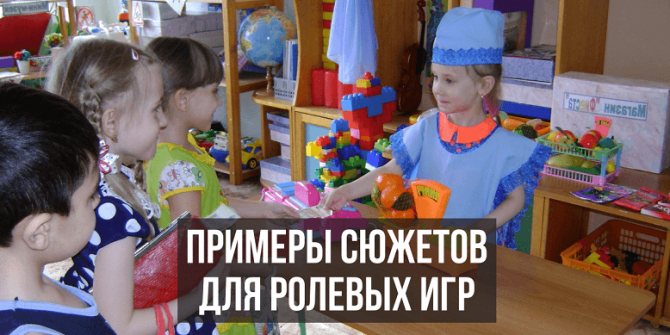
Plot "Zoo"
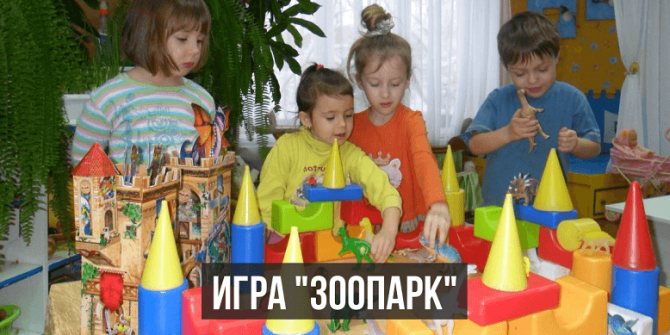
Our goal: we replenish the child’s vocabulary, give knowledge about animals, teach their habits and sounds, and cultivate in children a love for animals.
Props: toy animals, cash register (a calculator will help you), tickets to enter the zoo, money (cut up pieces of paper), vegetables for the animals.
Plot of the game: We are going to the zoo, we go, we buy tickets at the box office, we walk around the zoo, the guide (mom or dad) tells the children about the animals, we feed the animals.
Plot "Kindergarten"
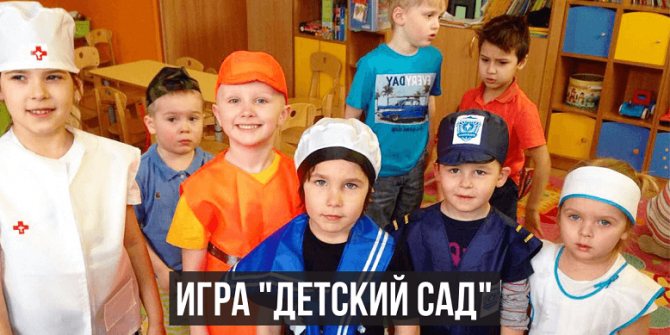
Our goal: to tell about the kindergarten, about its rules, about teachers and nannies, to teach children to take care in the role of educators.
Props: room (kindergarten) and all the necessary toys.
The plot of the game: we replay from the very beginning of the day, the trip to the garden, everything that usually happens in the garden, until the moment when the parents take the children home from the garden.
Plot “Public transport (bus)”
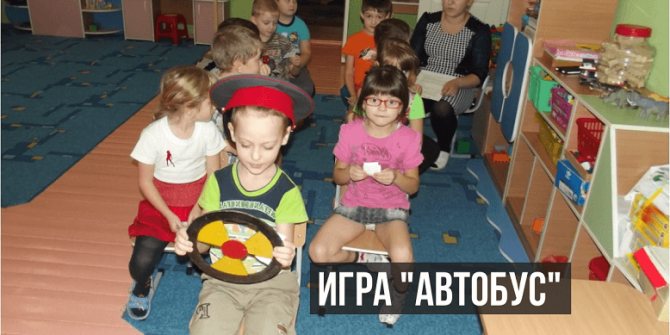
Our goal: to explain the tasks and responsibilities of the driver, conductor and passengers, to explain the rules of behavior in transport.
Props: chairs, tickets, money, driver’s cap
The plot of the game: we stand at the bus stop, wait for the bus, get on, buy a ticket, follow the rules of behavior, warn in advance about the desired stop.








